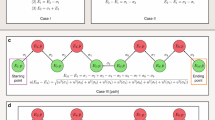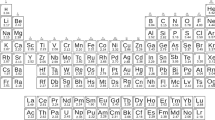Abstract
THE region 900–1,000 cm.−1 of the infra-red spectrum of organic molecules is useful for characterizing the type of unsaturation that may be present. This region is associated with the bending frequencies of hydrogen attached to an olefinic carbon. Thus the groups  give rise to characteristic bands at 909–916 cm.−1 and 964–979 cm.−1 respectively1.
give rise to characteristic bands at 909–916 cm.−1 and 964–979 cm.−1 respectively1.
This is a preview of subscription content, access via your institution
Access options
Subscribe to this journal
Receive 51 print issues and online access
$199.00 per year
only $3.90 per issue
Buy this article
- Purchase on Springer Link
- Instant access to full article PDF
Prices may be subject to local taxes which are calculated during checkout
Similar content being viewed by others
References
McMurry, H. L., and Thornton, V., Anal. Chem., 24, 318 (1952).
Jackson, J. E., Paschke, R. F., Tolberg, w., Boyd, H. M., and Wheeler, D. H., J. Amer. Oil Chem. Soc., 29, 229 (1952).
Privett, O. S., Lundberg, W. O., Khan, N. A., Tolberg, W. E., and Wheeler, D. H., J. Amer. Oil Chem. Soc., 30, 61 (1953).
Wheeler, D. H., “Progress in the Chemistry of Fats and other Lipids”, 2, 274 (Pergamon Press, Ltd., London, 1954).
Author information
Authors and Affiliations
Rights and permissions
About this article
Cite this article
CHAPMAN, D., TAYLOR, R. Infra-Red Assignments of Unsaturation in the Region 900–1,000 cm.−1. Nature 174, 1011–1012 (1954). https://doi.org/10.1038/1741011b0
Issue Date:
DOI: https://doi.org/10.1038/1741011b0
Comments
By submitting a comment you agree to abide by our Terms and Community Guidelines. If you find something abusive or that does not comply with our terms or guidelines please flag it as inappropriate.



